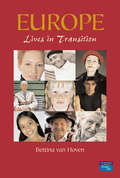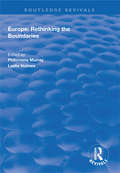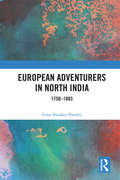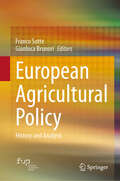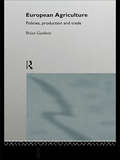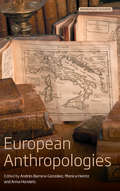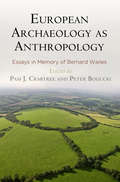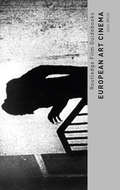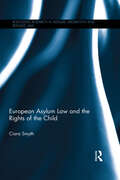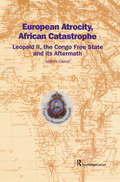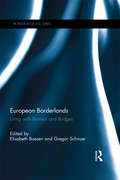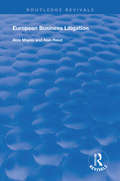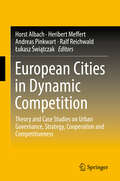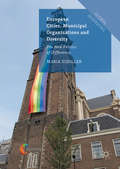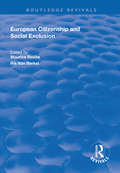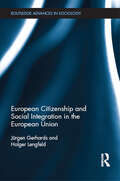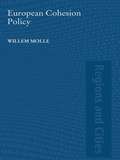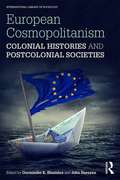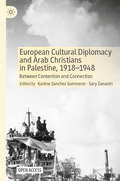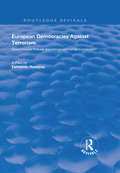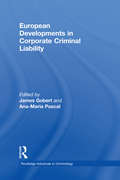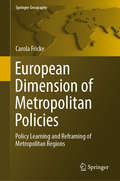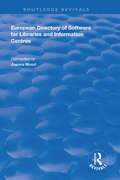- Table View
- List View
Europe: Lives in Transition
by Tim Unwin Bettina Van HovenFirst published in 2003. Routledge is an imprint of Taylor & Francis, an informa company.
Europe: Rethinking the Boundaries (Routledge Revivals)
by Leslie Holmes Philomena MurrayFirst published in 1999, Europe: Rethinking the Boundaries explores the themes of boundary and identity from cultural, political, sociological and historical perspectives. The volume highlights the multiplicity of approaches and the complexity of the understanding of what is Europe, while at the same time presenting a coherent theme of boundary which is both thought-provoking and comprehensive. It focuses on Europe’s changing boundaries and the "clash of civilisations" thesis, the European transformation of the nation state, rethinking European peripheries and European Union (EU) enlargement, the Mediterranean boundaries of the EU, Balkan boundaries, Europe and the "Islamic threat", German foreign policy and European security, and the neutrality of Austria, Finland and Sweden in the EU. Europe: Rethinking the Boundaries will appeal both to informed generalists and to students and scholars of Europe who seek an analysis of the issue of boundaries from a variety of perspectives. It is a timely collection of up to date commentary and analysis from a team of experts which provides a fresh approach to the discussion of boundaries in Europe. It points to pressing issues facing Europe at a difficult and challenging time.
European Adventurers in North India: 1750–1803
by Uma Shanker PandeyThis book explores how European, particularly French, adventurers shaped early modern India. It highlights the significant contributions of these adventurers in social, political, economic, and intellectual life of north India in the 18th and the 19th centuries. The author examines how the French adventurers played a key role in bringing Western science and ideas to a polity in flux. He examines the role of individuals like René Madec, Sombre, De Boigne, Perron, Gentil, Canaple, Delamarr, Sonson, and Pedrose, who made instrumental contributions in modernising armies of pre-modern states in South Asia. The volume also underlines how French adventurers’ commercial networks developing from their enterprises opened up markets in the heartlands of north India for European consumers. Further, it brings to the fore intellectual pursuits of the leading French figures such as Anquetil Duperron, Polier, Gentil, De Boigne, and Perron, whose engagement with Indian literature opened a new chapter framing studies of the Occident. Rich in French, English, and translated Persian archival resources, this book will be of interest to scholars and researchers of colonial history, early modern history, military history, and South Asian studies.
European Agricultural Policy: History and Analysis
by Gianluca Brunori Franco SotteThis book presents the European Common Agricultural Policy by tracing its crucial stages from its conception to the present days. It reconstructs the negotiating processes that have taken place at the political and institutional level over the years. At the same time, the book brings together the results of analyses made by agricultural policy scholars to propose solutions, and to evaluate the policies adopted and the results they produced. The book takes on a twofold objective: to understand how many of today’s problems have roots whose branches extend back in time, and to draw, from the lessons of history, useful insights for endowing the European Union with an ambitious agricultural and rural development policy, suited to the challenges ahead.
European Agriculture: Policies, Production and Trade
by Brian GardnerThe Common Agricultural Policy (CAP) is central to both economic and environmental developments in Europe. But with the advent of new environmental legislation and political change in Europe the CAP faces increasing pressure to reform. European Agriculture provides a comprehensive breakdown of the workings of the CAP and its impact on farming in Europe. The author discusses every aspect of European agricultural policy, production and trade, from environmental contraints and the impact of biotechnology, to the role of European farming in the world food supply system. Posing direct questions about the recent 1992 agricultural reform, the 1994 GATT agreement and the reasons for the expensive continuation of the CAP, European Agriculture analyses the economic, political and environmental implications of pursuing present farming policy and provides a provocative commentary on the agricultural future of Europe.
European Anthropologies
by Andrés Barrera-González Monica Heintz Anna HoroletsIn what ways did Europeans interact with the diversity of people they encountered on other continents in the context of colonial expansion, and with the peasant or ethnic 'Other' at home? How did anthropologists and ethnologists make sense of the mosaic of people and societies during the nineteenth and twentieth centuries, when their disciplines were progressively being established in academia? By assessing the diversity of European intellectual histories within sociocultural anthropology, this volume aims to sketch its intellectual and institutional portrait. It will be a useful reading for the students of anthropology, ethnology, history and philosophy of science, research and science policy makers.
European Archaeology as Anthropology: Essays in Memory of Bernard Wailes
by Pam J. Crabtree Peter BoguckiSince the days of V. Gordon Childe, the study of the emergence of complex societies has been a central question in anthropological archaeology. However, archaeologists working in the Americanist tradition have drawn most of their models for the emergence of social complexity from research in the Middle East and Latin America. Bernard Wailes was a strong advocate for the importance of later prehistoric and early medieval Europe as an alternative model of sociopolitical evolution and trained generations of American archaeologists now active in European research from the Neolithic to the Middle Ages. Two centuries of excavation and research in Europe have produced one of the richest bodies of archaeological data anywhere in the world. The abundant data show that technological innovations such as metallurgy appeared very early, but urbanism and state formation are comparatively late developments. Key transformative process such as the spread of agriculture did not happen uniformly but rather at different rates in different regions.The essays in this volume celebrate the legacy of Bernard Wailes by highlighting the contribution of the European archaeological record to our understanding of the emergence of social complexity. They provide case studies in how ancient Europe can inform anthropological archaeology. Not only do they illuminate key research topics, they also invite archaeologists working in other parts of the world to consider comparisons to ancient Europe as they construct models for cultural development for their regions. Although there is a substantial corpus of literature on European prehistoric and medieval archaeology, we do not know of a comparable volume that explicitly focuses on the contribution that the study of ancient Europe can make to anthropological archaeology.
European Art Cinema (Routledge Film Guidebooks)
by John WhiteEuropean art cinema includes some of the most famous films in cinema history. It is elite filmmaking that stands in direct opposition to popular cinema; and yet, it also has an intimate relationship with Hollywood. This guidebook sketches successive phases of art cinema in Europe from its early beginnings of putting Shakespeare’s plays on the screen, through movements such as Expressionism and Surrealism, to the New Waves of the 1960s and more recent incarnations like Dogme 95. Using film examples, John White examines basic critical approaches to art cinema such as semiotics and auteur theory, as well as addressing recurring themes and ideas such as existentialism and Christian belief. The different levels of political commitment and social criticism, which appear in many of these films, are also discussed. The book includes case studies of eight representative films: • The Cabinet of Dr Caligari (Wiene, 1920) • Earth (Dovzhenko, 1930) • A Man Escaped (Bresson, 1956) • Hiroshima mon amour (Resnais, 1959) • Aguirre, Wrath of God (Herzog, 1972) • Comrades (Douglas, 1986) • Le Quattro Volte (Frammartino, 2010) • Silence (Collins, 2012).
European Asylum Law and the Rights of the Child: European Asylum Law And The Rights Of The Child (Routledge Research in Asylum, Migration and Refugee Law)
by Ciara SmythThe child asylum seeker poses unique challenges for reception and refugee status determination systems, not least because the child is entitled to have his or her rights as a child respected as a matter of international and regional human rights law. In the last decade the European Union has increasingly engaged with children’s rights, with the entry into force of the Lisbon Treaty in December 2009, and a new Article 3(3) of the Treaty on European Union that commits the Union to promoting the ‘protection of the rights of the child.’ This book addresses the question of whether the Common European Asylum System (CEAS) complies with the rights of the child. It contrasts the normative standards of international child rights law with the treatment of child asylum seekers and refugees in the CEAS. Ciara Smyth identifies the attributes of the rights of the child that are most relevant to the asylum context and systematically examines whether and to what extent those attributes are reflected in the CEAS legislation. The book goes on to assess whether the CEAS instruments direct Member States to comply with the rights of the child, offering a comprehensive examination of the place of the child within European asylum law and policy. The book will be of great use and interest to scholars and students of international law, immigration and children’s rights studies.
European Atrocity, African Catastrophe: Leopold II, the Congo Free State and its Aftermath
by Martin Ewans Sir Martin EwansThere is a broad consensus among those who are concerned with Africa that the plight of the continent is approaching the catastrophic. Partly the roots of the problem are historical, stemming from the exploitation and colonisation of the continent by European powers. An appreciation of the history of the relationship between Europe and Africa, a major episode of which this book examines, is indispensable to an understanding of the continent's present predicament. In the late 19th and early 20th centuries King Leopold II of the Belgians established a colony in Africa, which, as the Congo Free State, became a byword for unremitting exploitation and widespread atrocities. This book describes the creation, the development and the collapse both of this regime and of the Belgian colony that replaced it. Conclusions are drawn about the nature of European colonialism in Africa and the consequences for Europe itself.
European Borderlands: Living with Barriers and Bridges (Border Regions Series)
by Edited by Elisabeth Boesen and Gregor schnuerThe expectations of European planners for the gradual disappearance of national borders, and the corresponding prognoses of social scientists, have turned out to be over-optimistic. Borders have not disappeared – not even in a unified and predominantly peaceful Europe – but rather they have changed, become more varied and, in a certain sense, mobile, taking on an important role in the everyday lives of more people than ever before. Furthermore, it is now widely accepted that borders do not just hinder communication and the formation of relationships, but also channel and prefigure them in a positive way. Presenting a number of studies of everyday life in European borderlands, this book addresses the multifarious and complex ways in which borders function as both barriers and bridges. Focusing on ‘established’ Western European borderlands – with the exception of three contrasting cases – the book attempts a turn from conflict to harmony in the study of borderlands and thus examines the more mundane manifestations of border life and the complex, often unconscious motives of everyday cross-border practices. The collection of chapters demonstrates that even in the case of ‘open’ political borders, the border remains an enduring factor that is not adequately described as either a problematic barrier or a desirable bridge. The studies look at bordering processes, not only approaching them from different disciplinary angles – sociology, anthropology, geography, history, political science and literary studies – but also choosing different scales and making comparisons that range from different borders of one country to the reactions and attitudes of different individuals in a single borderland village.
European Business Litigation (Routledge Revivals)
by Alan Reed Abla MayssFirst published in 1998, European Business Litigation is a monograph produced as a follow-up step to European Business Law which contains a range of chapters, including a chapter on Business Litigation. Hence, as well as expanding on the issues raised in the chapter, this book provides an insight into the legal and policy problems involved in both the harmonisation process and the substantive EU laws adopted to ameliorate the situation in the field of Private International Law. More specifically, it examines the origin of EU laws in this area, considers the problems with their interpretation and implementation, and addresses the question of whether harmonisation has been achieved.
European Cinemas, European Societies: 1939-1990 (Studies In Film, Television And The Media Ser.)
by Pierre SorlinFirst published in 2004. Routledge is an imprint of Taylor & Francis, an informa company.
European Cities in Dynamic Competition: Theory and Case Studies on Urban Governance, Strategy, Cooperation and Competitiveness
by Horst Albach Heribert Meffert Andreas Pinkwart Ralf Reichwald Łukasz ŚwiątczakWorld population and the number of city dwellers are steadily growing. Globalization and digitalization lead to an increased competition for skilled and creative labor and other economic resources. This is true not only for firms, but increasingly also for cities. The book elaborates on resulting challenges and opportunities for urban management from the European perspective, and discusses theories, methods and tools from business economics to cope with them. Contributions in this volume come from scholars and practitioners of economics, business administration and urban management, and cover aspects ranging from urban dynamics to city marketing. They draw on experiences from several European cities and regions, and discuss strategies to improve city performance including Open Government, Smart City, cooperation and innovation. The book project was initiated and carried out by the Center for Advanced Studies in Management (CASiM), the interdisciplinary research center of HHL Leipzig Graduate School of Management. It is addressed to scholars and managers in Europe and beyond, who will benefit from the scientific rigor and useful practical insights of the book.
European Cities, Municipal Organizations and Diversity
by Maria SchillerThis book challengesthe prevailing view that local authorities are irrelevant in immigrationpolicy-making. Presenting an in-depth ethnographic study of the recentimplementation of local 'diversity policies' in the Netherlands, Belgium andUnited Kingdom, it identifies a new politics of difference, characterized by a'paradigmatic pragmatism'. Building on extensive fieldwork in Amsterdam,Antwerp and Leeds, the author shows that, rather than simply replacing anearlier politics of difference, local diversity policies combine ideals ofmulticulturalism, assimilation and diversity. She links these findings to theongoing modernization and diversification of municipal authorities, and theimpact of this transformation on the profile of the bureaucrats and theirimplementation of diversity policies. This thought-provoking work will appealto students, researchers and practitioners engaged in the fields ofimmigration, diversity and multiculturalism.
European Citizenship and Social Exclusion (Routledge Revivals)
by Maurice Roche Rik Van BerkelFrist published in 1997, this book aims to answer if European ‘post-national’ citizenship provide a practical opening and a conceptual challenge to cope with the diverse and close-circuiting crises of national European social models? What then might a new sphere of European social inclusion look like? This book also provided the first attempt to go well beyond ‘national gridlock’. Old solutions will no longer do. Is new land in sight? With monetary integration almost implemented this is a highly relevant exploration of a central complementary ‘common currency’ in Europe’s future.
European Citizenship and Social Integration in the European Union (Routledge Advances in Sociology)
by Jürgen Gerhards Holger LengfeldSince 2008, the European Union has been affected by one of the most severe crises in the history of Europe. This book builds on the work of Jürgen Habermas to answer the key question: is Europe strong enough to overcome the recent crisis? Arguing that recovery can only take place if the citizens of Europe regard themselves as members of a socially integrated European society, this volume sets out three conditions for successful European social integration: <P><P> European citizens mutually respect each other as equals, accepting that all EU citizens should have equal economic, political and social rights. Those citizens objecting to the idea of European equality should not constitute a minority with potential for mobilisation that could impede the ongoing process of European social integration. Europeans act upon their equality beliefs in everyday practice – without differentiating between nationals and EU migrants. <P><P> Based on a survey carried out in Germany, Spain, Poland and Turkey, the authors argue that the requirements for a socially integrated Europe are largely in place already. Their findings allow for optimism regarding the future of the EU, as the cultural foundations for a democratisation of Europe are laid. This volume develops a theoretical framework of a socially integrated European community, and will be useful for students and scholars of sociology, citizenship studies, social policy, political science and European studies.
European Civil War Films: Memory, Conflict, and Nostalgia (Routledge Advances in Film Studies)
by Eleftheria Rania KosmidouThis book examines the ways in which late twentieth-century European cinema deals with the neglected subject of civil war. Exploring a range of films about the Spanish, Irish, former Yugoslavia, and Greek civil wars, this comparative and interdisciplinary study engages with contemporary debates in cultural memory and investigates the ways in which cinematic postmemory is problematic. Many of the films present an idealized past that glosses over the reality of these civil wars, at times producing a nostalgic discourse of loss and longing. Other films engage with the past in a melancholic fashion. These cinematic discourses articulate contemporary concerns, especially the loss of ideology and a utopian political horizon in the aftermath of the collapse of the Soviet bloc in 1989, a date that marks a significant break in European history and an accompanying paradigm shift in European cultural memory. Filmmakers examined include Trueba, Cuerda, Loach, Jordan, Kusturica, Dragojević, and Angelopoulos.
European Cohesion Policy: The Theory And Practice Of European Policy Making (Regions and Cities)
by Willem MolleThe only comprehensive text available for advanced study and professional reference, this book brings much needed clarity to both the theoretical and practical aspects of EU intervention. Integrating both theoretical and practical research in a clear and accessible structure, covering economic, social and territorial issues European Cohesion Policy provides a systematic view of the various stages of the whole policy cycle, looking in detail at: the evolution of the problems the design of the policy system the implementation in practice the evaluation of effects . An authoritative analysis of the problems and debates involved, European Cohesion Policy is essential reading for students, policy makers, development workers and researchers working in all aspects of European policy.
European Cosmopolitanism: Colonial Histories and Postcolonial Societies (International Library of Sociology)
by Gurminder K. Bhambra John NarayanThis book provides a fresh examination of the cosmopolitan project of post-war Europe from a variety of perspectives. It explores the ways in which European cosmopolitanism can be theorized differently if we take into account histories which have rarely been at the forefront of such understandings. It also uses neglected historical resources to draw out new and unexpected entanglements and connections between understandings of European cosmopolitanism both in Europe and elsewhere. The final part of the book places European cosmopolitanism in tension with contemporary postcolonial configurations around diaspora, migration, and austerity. Overall, it seeks to draw attention to the ways in which Europe’s posited others have always been very much a part of Europe’s colonial histories and its postcolonial present.
European Cultural Diplomacy and Arab Christians in Palestine, 1918–1948: Between Contention and Connection
by Karène Sanchez Summerer Sary ZananiriThis open access book investigates the transnationally connected history of Arab Christian communities in Palestine during the British Mandate (1918-1948) through the lens of the birth of cultural diplomacy. Relying predominantly on unpublished sources, it examines the relationship between European cultural agendas and local identity formation processes and discusses the social and religious transformations of Arab Christian communities in Palestine via cultural lenses from an entangled perspective. The 17 chapters reflect diverse research interests, from case studies of individual archives to chapters that question the concept of cultural diplomacy more generally. They illustrate the diversity of scholarship that enables a broad-based view of how cultural diplomacy functioned during the interwar period, but also the ways in which its meanings have changed. The book considers British Mandate Palestine as an internationalized node within a transnational framework to understand how the complexity of cultural interactions and agencies engaged to produce new modes of modernity.
European Democracies Against Terrorism: Governmental Policies and Intergovernmental (Routledge Revivals)
by Fernando ReinaresThis title was first published in 2000. In this multidisciplinary volume, contributors critically assess the different measures designed and implemented by western European democratic governments since the late 1960s in order to counter the challenge of terrorism. The work also analyzes the problems and perspectives surrounding intergovernmental co-operation against such evolving phenomenon, as developed within the framework of the European Union.
European Developments in Corporate Criminal Liability (Routledge Advances in Criminology)
by James Gobert Ana-Maria PascalWhen corporations carry on their business in a grossly negligent manner, or take a cavalier approach to risk management, the consequences can be catastrophic. The harm may be financial, as occurred when such well-regarded companies as Enron, Lehman Brothers, Worldcom and Barings collapsed, or it may be environmental, as illustrated most recently by the Gulf oil spill. Sometimes deaths and serious injuries on a mass scale occur, as in the Bhopal gas disaster, the Chernobyl nuclear explosion, the Paris crash of the Concorde, the capsize of the Herald of Free Enterprise, and rail crashes at Southall, Paddington and Hatfield in England.What role can the law play in preventing such debacles and in punishing the corporate offenders? This collection of thematic papers and European country reports addresses these questions at both a theoretical and empirical level. The thematic papers analyse corporate criminal liability from a range of academic disciplines, including law, sociology/criminology, economics, philosophy and environmental studies, whilst the country reports look at the laws of corporate crime throughout Europe, highlighting both common features and irreconcilable differences between the various jurisdictions.
European Dimension of Metropolitan Policies: Policy Learning and Reframing of Metropolitan Regions (Springer Geography)
by Carola FrickeThis book questions how policies for the metropolis become Europeanised. The book analyses how spatial concepts and political ideas permeate the European multi-level system. Through an interpretive comparison of five contexts, the book provides an overview of the European orientation tracing two interdependent developments. First, the book examines references to ‘Europe’ in national and subnational policies. In French and German policies, metropolitan regions are increasingly framed as being central not only for inter-municipal coordination, but also as nodes within the European space. Moreover, Europeanised metropolitan regions such as Lyon and Stuttgart develop European strategies. The second development shows how metropolitan regions appear as actors and issues in the European policy arena, contributing to a tentative and implicit metropolitan dimension. This multi-scalar analysis is of interest for scholars and practitioners specialised in metropolitan regions, European urban and regional policies, geography and related areas.
European Directory of Software for Libraries and Information Centres (Routledge Revivals)
by Joanna WoodFirst Published in 1993 A Directory of Library and Information Software for Microcomputers has been published in four highly successful editions. The growth of interest in and proliferation of software packages in Europe has caused this new edition of the Dictionary to concentrate on the software that is both actively marketed in Europe and that has good back up support. The coverage is restricted to microcomputer software that is running under MS DOS/PC DOS, OS/2, UNIX, PICK and APPLE MACINTOSH operating systems. All software suitable for use in library and information work will be included, but not industry-standard word processing spreadsheets, accounts or other office administration systems. Coverage of Europe includes the 12 EC countries together in Sweden, Norway, Finland, Switzerland and Austria. More than 278 packages are listed originating from 299 suppliers. The European Directory is arranged in a straight alphabetical sequence by software name, indexed by country, by operating system and by supplier.
